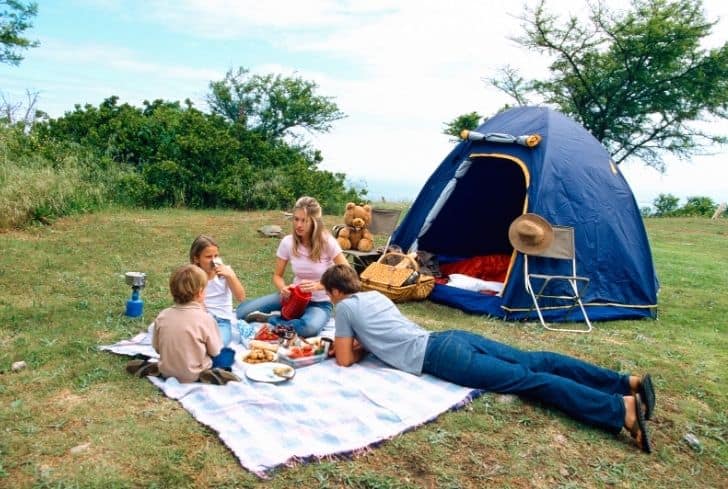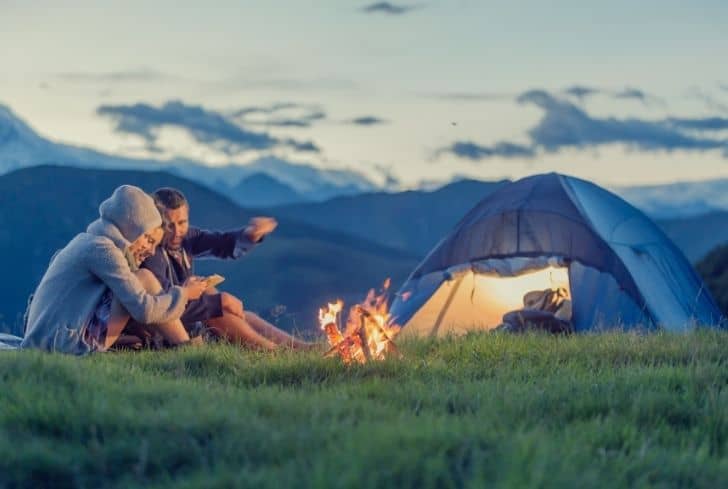Camping is an outdoor recreational activity that involves overnight stay away from home in a shelter such as a tent or a caravan. Camping is a wonderful experience if you’re ready to understand what it feels like to live off the land. Of course, with our modern technologies and conveniences, we don’t have to completely live off of the land. We have tents, portable stovetops, grills, coolers, portable dishware and more.
Yet, there is nothing that can compare to getting back to nature and sleeping under the stars. It’s something everyone should try at least once. Even with all of the items mentioned earlier, you still need to be self-reliant. While camping does feel quite environmentally friendly already, there are ways to make it even greener.
Camping with friends and family involves a lot of fun. Going green with camping is an environmentally friendly way to make your vacation eco-friendly. The idea of making a greener camping is to have a minimal impact on the environment. Whether you are planning a week-long backpacking trip or a short trip to snow-covered mountains, here are some impressive tips to help you go green while camping.
Trends in Eco-friendly Camping
- Camping equipment designs. The camping world is moving ahead with water-repellent down insulation for sleeping bags that come with USB drives. You can also find bear-resistant coolers and light-weight camping stoves.
- A wide variety of camping programs. If you loved camping as a kid, you’ll be happy to know that many service providers are offering camping programs tailored to adults. They offer active adults the opportunity to experience camping and all that it entails.
- Increase in eco-friendly camping equipment. Consumers are becoming more interested in the sustainability of products. These include products that are BPA-free and use recycled materials.
20+ Impressive Tips To Go Green While Camping
1. Leave Your Campsite the Way You Found it
Even if you used mostly biodegradable materials, that doesn’t mean you have to leave your trash behind. It is important to leave your campsite the exact way you found it. What if the campers before you left all of their trash behind? Wouldn’t that be annoying?
Instead of getting down to the business of camping, you have to start your trip by cleaning up after someone else. That would put a damper on anyone’s trip. So, be mindful of leaving anything behind. Bring extra cloth bags to store all of your items for the trip back home.
2. Soft Soles
You should tread lightly. You want to minimize your disturbance to the land. So, wear soft-soled shoes. You never know what might be waiting to shoot up beneath you. Remember, the plants and wildlife were there before you.
We have our concrete jungles, give nature some space to live too. Also, don’t level the ground underneath your camp. It is that way for a reason. Instead, place cloths under a sloping mat to keep it level.
3. Green Cleaning
If you’re camping for more than one night, you’ll have to do some washing. If you have reusable plates, cups and silverware–that is a good start. When washing them, use only biodegradable soaps. Don’t cancel out your green camping trip with toxic dish detergent. Also, do not dump wastewater into a stream or river. Empty it on dry ground or vegetation.
4. Your Tent
It is important to look for sustainable camping gear. Look for camping tents made with 100 percent recycled materials. This should include the tent, fly and floor. Then, determine what types of coatings are used for waterproofing. You want a tent that uses solvent-free polyurethane coating. And it helps if it is made without toxic dyes. If you want to go glamping, you might consider a prefab A-frame wooden cabin from Lushna.
They are made with natural untreated, exterior-grade larch wood, while the floor is made from spruce. In addition, they have an integrated ventilation system and electrical outlets. Moreover, it can fit a king-size bed. You can also look for a pre-owned tent at most sporting goods stores. Just look at the materials before your purchase.
5. Hanging Tents
You might want to try a hanging tent. These are like sleeping in a tree. Sometimes, the ground is too cold, soggy and hard to be comfortable. For situations like these, the Tenstilecompany has created a hanging tent. It is called the Stingray, and it can help you camp anywhere you can suspend it off the ground.
It is also made to fit three campers comfortably. You won’t have to worry about creepy crawlies while you sleep. Plus, you’ll have a much better view.
6. Solar Tents
Have you heard of solar tents? This is a new movement in sustainable camping that also turns it into glamping. A solar tent uses solar fabric that catches the sun’s energy. It also comes with wireless charging pouches to let you charge your devices through magnetic induction. If that isn’t enough, you can make the tent light up through a message sent from your smartphone.
7. Sleeping Bags(repeated twice, here omitted)
Again, look for sleeping bags made of recycled materials. If the weather permits, you might just stick to cloth blankets.
8. Mosquito Repellent
There are lanterns that double as a mosquito repeller. You can often use them to light up your surroundings for over 10 hours each time. Plus, they can protect you from nighttime predators.
9. Portable Shower System
Look for a rinsing system that uses garden hose pressure without the need for batteries or a pump. These types of shower systems compress air in the chamber, which then helps to force water out of the nozzle. This can be used to rinse dirty feet or wash dishes.
10. Portable Stove
Open wood fires can be dangerous for campers and the surrounding environment. A better option is a green stove that efficiently burns wood but has the same output as gas.
11. Portable Solar Lamp
Carrying a lamp wherever you go can get bulky. The good news is you can find collapsible and portable solar-powered lamps. You can hang the lamp on a tree branch to soak up the sun’s energy during the day time. At night, the lamp shines brightly so that you don’t have to be stuck in the dark. In cases where you have to use batteries, use rechargeable batteries to power your flashlights, headlamps, and lanterns.
12. Food Storage
Look for containers that have no BPA or phthalates. These chemicals can leak into your food, even in a microwave. You want something convenient to travel with you without any messes. Look for leaks, break and spill-proof containers. Plus, the design should be compact so as not to take up too much space and easily transport food.
Using disposable items especially utensils seem easier for camping, but it’s more environmentally to use reusable, unbreakable containers, dishes, cutlery, and cups; pack a small basin, sponge and biodegradable soap where you can clean after use and dispose of the water on dry grounds.
13. Refillable Water Bottles
Many times people can be seen bringing a pack of water bottles along with them. This creates overhead as most parks require campers to pick their trash along with them. A better way is to bring a large water container or buy a couple of gallons from which you can refill your water bottle during the trip.
You can also bring water in recycled jugs or freeze a few ¾th full jugs and bring it along. You can use them as ice in the cooler and can even drink after they thaw. Later refill the jugs from the local tap. Carry along a filtering pitcher in case you have a discerning palette. This saves time, money and resources.
14. Portable Solar Panels
The portable solar panels can also be carried to save energy for nighttime light usage. One 125-watt solar panel puts out 40-55 [amps] daily, which is enough to run everything except the hairdryer, A/C and microwave.
15. Wash Dishes
While camping, use reusable dishes or silverwares and wash dishes once or twice per day as per your requirement. It avoids litter from thrown away single-use plates and containers every time you have food and also save money.
16. Minimize Supplies
Take supplies that are just enough, not too much. Traveling lighter also means saving resources—like fuel. If you are not regular campers, look around in secondhand stores for used tents, backpacks, sleeping bags and camp stoves or borrow from friends who are regular campers.
17. Reusable Bins/Bags
Avoid using tin foil, plastic wrap or grocery bags. Try to use reusable plastic see-through bins and heavy-duty, reusable plastic bags. Set up recycling bags or bins immediately. If possible, pack your garbage out of the campgrounds to sort and recycle later at home.
18. Use a Clothesline
Utilize free wind and sun energy using a cloth line to dry your swimsuits, towels and other items that you feel you must wash.
19. Use an All-in-One Biodegradable Soap
Use an all-in-one biodegradable soap for dishes, showering and also laundering. There are many companies like Burt’s Bees and Campsuds that sell an all-in-one wash for dishes and bodies and are made specifically for camping.
The best is to use eco-friendly soaps and detergents that do not use toxic chemicals like phosphate, having negative effects on natural systems. Try to make citrus-based all-purpose cleaners, dish detergents, natural mosquito repellents and your own natural sunscreen that won’t damage the environment.
20. Buy Your Produce From Local Farmers
You can find many farms of local farmers near your camping ground from which campers are welcome to enjoy the produce. It tastes better, and you can consider it an outing in search of local flavor or trying out new things.
21. Make Campfire Safe
Try to start a campfire without lighter fluid or gasoline and make your Campfire Safe. Use local wood from dead branches and fallen trees to make a campfire. Try not to cut down living trees or to bring in outside firewood to the camp as it can carry insects, seeds, or microorganisms that could harm native species.
If you camp in an area where fire danger is more, take steps to minimize your chances of starting a fire. Keep used water after cleaning utensils nearby that can be used in case of an emergency. Also, build a fire away from the tent or any surrounding vegetation. An environment-friendly solar-powered cooker is much advised while camping when you’re finished cooking; before going to sleep, extinguish the fire with used water.
22. Leave the Extra Electronic Gadgets at Home
Do you really need more than a mobile phone? Think and cut short while you camp. Charge your phone when it’s almost discharged instead of leaving it plugged.
You probably never imagined that camping could be even more eco-friendly than it already is. The objective is to continue trying to do as much as you can to care for the environment.







